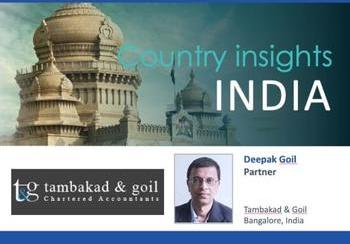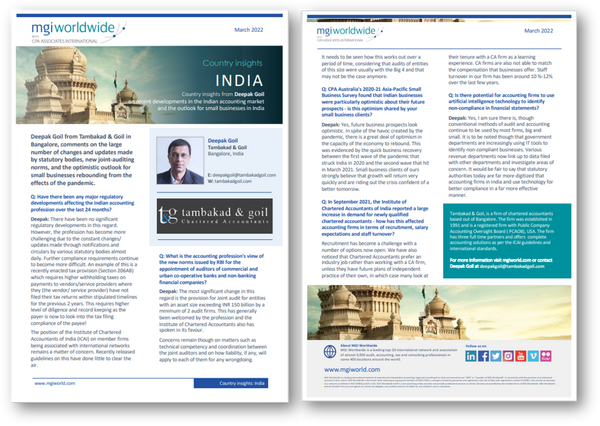MGI Worldwide member firm Tambakad & Goil shares valuable insights on the Indian accounting market and the outlook for small businesses in India

Deepak Goil from Tambakad & Goil in Bangalore, comments on the large number of changes and updates made by statutory bodies, new joint-auditing norms, and the optimistic outlook for small businesses rebounding from the effects of the pandemic.
Q: Have there been any major regulatory developments affecting the Indian accounting profession over the last 24 months?
Deepak Goil: There have been no significant regulatory developments in this regard. However, the profession has become more challenging due to the constant changes/updates made through notifications and circulars by various statutory bodies almost daily. Further compliance requirements continue to become more difficult. An example of this is a recently enacted tax provision (Section 206AB) which requires higher withholding taxes on payments to vendors/service providers where they (the vendor/service provider) have not filed their tax returns within stipulated timelines for the previous 2 years. This requires higher level of diligence and record keeping as the payer is now to look into the tax filing compliance of the payee!
The position of the Institute of Chartered Accountants of India (ICAI) on member firms being associated with international networks remains a matter of concern. Recently released guidelines on this have done little to clear the air.
Q: What is the accounting profession's view of the new norms issued by RBI for the appointment of auditors of commercial and urban co-operative banks and non-banking financial companies?
Deepak: The most significant change in this regard is the provision for joint audit for entities with an asset size exceeding INR 150 billion by a minimum of 2 audit firms. This has generally been welcomed by the profession and the Institute of Chartered Accountants also has spoken in its favour.
Concerns remain though on matters such as technical competency and coordination between the joint auditors and on how liability, if any, will apply to each of them for any wrongdoing.
It needs to be seen how this works out over a period of time, considering that audits of entities of this size were usually with the Big 4 and that may not be the case anymore.
Q: CPA Australia's 2020-21 Asia-Pacific Small Business Survey found that Indian businesses were particularly optimistic about their future prospects - is this optimism shared by your small business clients?
Deepak: Yes, future business prospects look optimistic. In spite of the havoc created by the pandemic, there is a great deal of optimism in the capacity of the economy to rebound. This was evidenced by the quick business recovery between the first wave of the pandemic that struck India in 2020 and the second wave that hit in March 2021. Small business clients of ours strongly believe that growth will return very quickly and are riding out the crisis confident of a better tomorrow.
Q: In September 2021, the Institute of Chartered Accountants of India reported a large increase in demand for newly qualified chartered accountants - how has this affected accounting firms in terms of recruitment, salary expectations and staff turnover?
Deepak: Recruitment has become a challenge with a number of options now open. We have also noticed that Chartered Accountants prefer an industry job rather than working with a CA firm, unless they have future plans of independent practice of their own, in which case many look at their tenure with a CA firm as a learning experience. CA firms are also not able to match the compensation that businesses offer. Staff turnover in our firm has been around 10%-12% over the last few years.
Q: Is there potential for accounting firms to use artificial intelligence technology to identify non-compliance in financial statements?
Deepak: Yes, I am sure there is, though conventional methods of audit and accounting continue to be used by most firms, big and small. It is to be noted though that government departments are increasingly using IT tools to identify non-compliant businesses. Various revenue departments now link up to data filed with other departments and investigate areas of concern. It would be fair to say that statutory authorities today are far more digitized that accounting firms in India and use technology for better compliance.
Click HERE to view the full Country Insight

About Tambakad & Goil
Tambakad & Goil is a firm of chartered accountants based out of Bangalore. The firm was established in 1991 and is a registered firm with Public Company Accounting Oversight Board (PCAOB), USA. The firm has three full time partners and offers complete accounting solutions as per the ICAI guidelines and international standards.
For more information contact Deepak Goil at [email protected] or visit the firm profile page and website.
MGI Worldwide with CPAAI, is a top 20 ranked global accounting network and association with almost 9,000 professionals, accountants and tax experts in some 400 locations in over 100 countries around the world.
